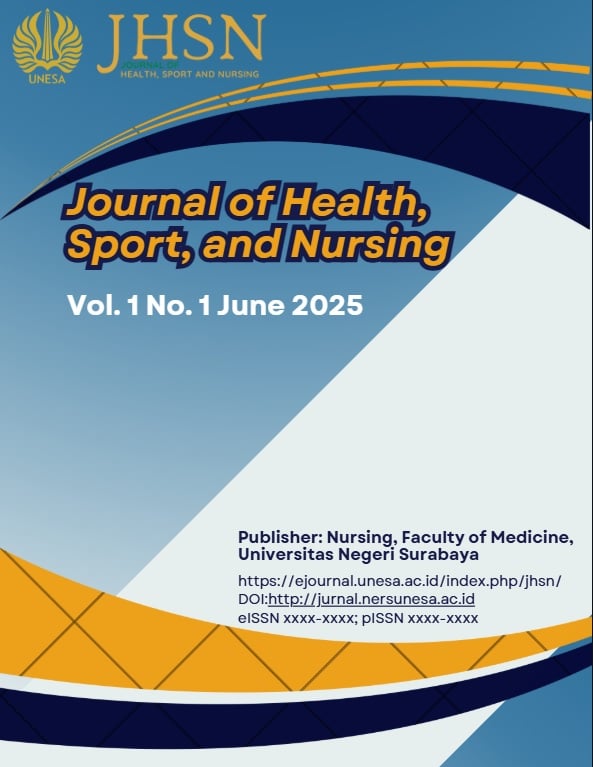THE RELATIONSHIP BETWEEN CLEAN AND HEALTHY LIVING BEHAVIOR KNOWLEDGE AND SCABIES PREVENTION IN CHILDREN
Keywords:
Knowledge , PHBS , ScabiesAbstract
Scabies or also known as scabies, gudig, and budug, is a skin disease caused by infection with the Sarcoptes scabiei mite variety hominis. Scabies is often ignored by society, this often occurs due to poor personal hygiene habits, and lack of knowledge. The purpose of this study is to analyze the relationship between knowledge about clean and healthy living behaviors and the prevention of scabies in children at MI Miftahul Ulum Blaban Batumar-mar, Pamekasan Regency, Madura. This research method uses correlation analysis with a cross-sectional approach. The population of Mi Miftahul Ulum Blaban Batumar-mar Pamekasan is 50 students. The study sample is 50 people selected as a whole. using the total sampling technique. The results of the study show Sig. value 0.000, so there is a Relationship between PHBS Knowledge and Scabies Prevention at MI Miftahul Ulum Blaban, Batu Mar-Mar District, Pamekasan Regency, Madura. Knowledge about clean and healthy living behaviors greatly affects the incidence of scabies. The higher the knowledge about clean and healthy living behaviors, the lower the risk of contracting diseases, one of which is scabies.
Downloads
References
Depkes RI. (2007). Perilaku Hidup Bersih Dan Sehat.
Dinkes Jawa Timur. (2022). Statistik Kesehatan Provinsi Jawa Timur. 1–80.
Fitriani, L. (2018). Internalisasi Nilai-Nilai Karakter Islami pada Anak Usia Dini Melalui Metode Berkisah. In Annual Conference on Islamic Early Childhood Education (ACIECE), 3(1), 121–154.
Hasan, I. (2020). Analisis Data Penelitian dengan Statistik (Edisi Kedua). Bumi Aksara.
Ibrahim, S., Abdelhameed, M. M., Ahmed, S. E., Ali, A. N., Atif, Y. A., Farahat, Y. G., Mohammed, M. M., & Abdelmohsen, R. S. (2023). Diagnostic Dermoscopic Feature Patterns of the Parasitic Skin Diseases. The Egyptian Journal of Hospital Medicine, 91(1), 4102–4109. https://doi.org/10.21608/ejhm.2023.294350
Ihtiaringtyas, S., Mulyaningsih, B., & Umniyati, S. R. (2019). Faktor Risiko Penularan Penyakit Skabies pada Santri di Pondok Pesantren An Nawawi Berjan Kecamatan Gebang Kabupaten Purworejo Jawa Tengah. Balaba: Jurnal Litbang Pengendalian Penyakit Bersumber Binatang Banjarnegara, 83–90. https://doi.org/10.22435/blb.v15i1.1784
Isramilda, Asa, A., & Purnama, R. Y. (2023). Faktor - Faktor yang Mempengaruhi Kejaian Skabies di Pondok Pesantres Darul Falah Kota Batam. 13(1), 351–361.
Kemenkes RI. (2019). Profil kesehatan Indonesa 2019. In Kementrian Kesehatan Republik Indonesia. https://pusdatin.kemkes.go.id/
Munfrida, M., Ririanty, M., & Nafikadhini, I. (2012). Efektivitas Buku Saku PHBS di Sekolah dalam Meningkatkan Perilaku Hidup Bersih dan Sehat. Jurnal Kesehatan, 6(4), 46–53. https://doi.org/10.25047/j-kes.v6i2.15
Nikmah, N., Handayani, N. I., & Firdaus, N. (2021). Analisis Personal Hygiene Dengan Kejadian Scabies Pada Santri Di Pondok Pesantren. Jurnal Nursing Update, 12(3), 48-53.
Notoatmodjo, S. (2016). Pengembangan Sumber Daya Manusia. Rineka Cipta.
Notoatmodjo, S. (2018). Metodologi Penelitian Kesehatan. Cetakan Ketiga. Jakarta: PT Rineka Cipta.
Nursalam. (2020). Metodologi Penelitian Ilmu Keperawatan : Pendekatan Praktis Edisi ke Tiga.
Oktaviana, M. D. (2019). Gambaran Perilaku Santri Tentang Pencegahan Scabies di Pondok Pesantren Darussalam Kepanjen. (Doctoral dissertation, Poltekkes RS dr. Soepraoen).
Puspita, S., Rustanti, E., & Wardani, meyliana kartika. (2018). Hubungan Personal Hygiene Dengan Kejadian Skabies Pada Santri. Jurnal Keperawatan, 2(1), 33–38.
Rahmawati, N., Utami, R. D. P., & Cahyaningtyas, M. E. (2019). Hubungan Antara Pengetahuan Orang Tua Tentang Phbs Dengan Perilaku Pencegahan Ispa. Intan Husada: Jurnal Ilmu Keperawatan, 8(2), 49–58.
Rosandi, M. E. T., & Sungkar, S. (2014). The Knowledge on Scabies Among Students in a Pesantren in East Jakarta, Before and After Health Education. E-Journal Kedokteran Indonesia, 2(3), 21–165. https://doi.org/10.23886/ejki.2.4501.
Saputra, R. (2021). Hubungan Pengetahuan, Sikap, Sarana Dan Jenis Kelamin Dengan Perilaku Hidup Bersih Dan Sehat (Phbs) Di Asrama Riau, Yogyakarta. Jurnal Kesehatan Dan Pengelolaan Lingkungan, 2(1), 88–93. https://doi.org/10.12928/jkpl.v2i1.4157
Wati, P. D. C. A., & Ridlo, I. A. (2020). Hygienic and Healthy Lifestyle in the Urban Village of Rangkah Surabaya. Jurnal PROMKES, 8(1), 47. https://doi.org/10.20473/jpk.v8.i1.2020.47-58
WHO. (2020). WHO methods and data sources for life tables 1990-2019. WHO Methods and Data Sources for Life Tables 1990-2019, December, 32.
Yakin, A. (2021). Pengetahuan PHBS pada Anak Usia Sekolah di Indonesia Literature Review Naskah Publikasi. Universitas ’Aisiyah Yogyakarta, 2(1), 45–75.
Downloads
Published
How to Cite
Issue
Section
License
Copyright (c) 2025 Asri Kusyani

This work is licensed under a Creative Commons Attribution-NonCommercial 4.0 International License.
In line with the license, authors and any users (readers and other researchers) are allowed to share and adapt the material only for non-commercial purposes. In addition, the material must be given appropriate credit, provided with a link to the license, and indicated if changes were made. If authors remix, transform or build upon the material, authors must distribute their contributions under the same license as the original.
 Abstract views: 55
,
Abstract views: 55
, PDF Downloads: 92
PDF Downloads: 92





